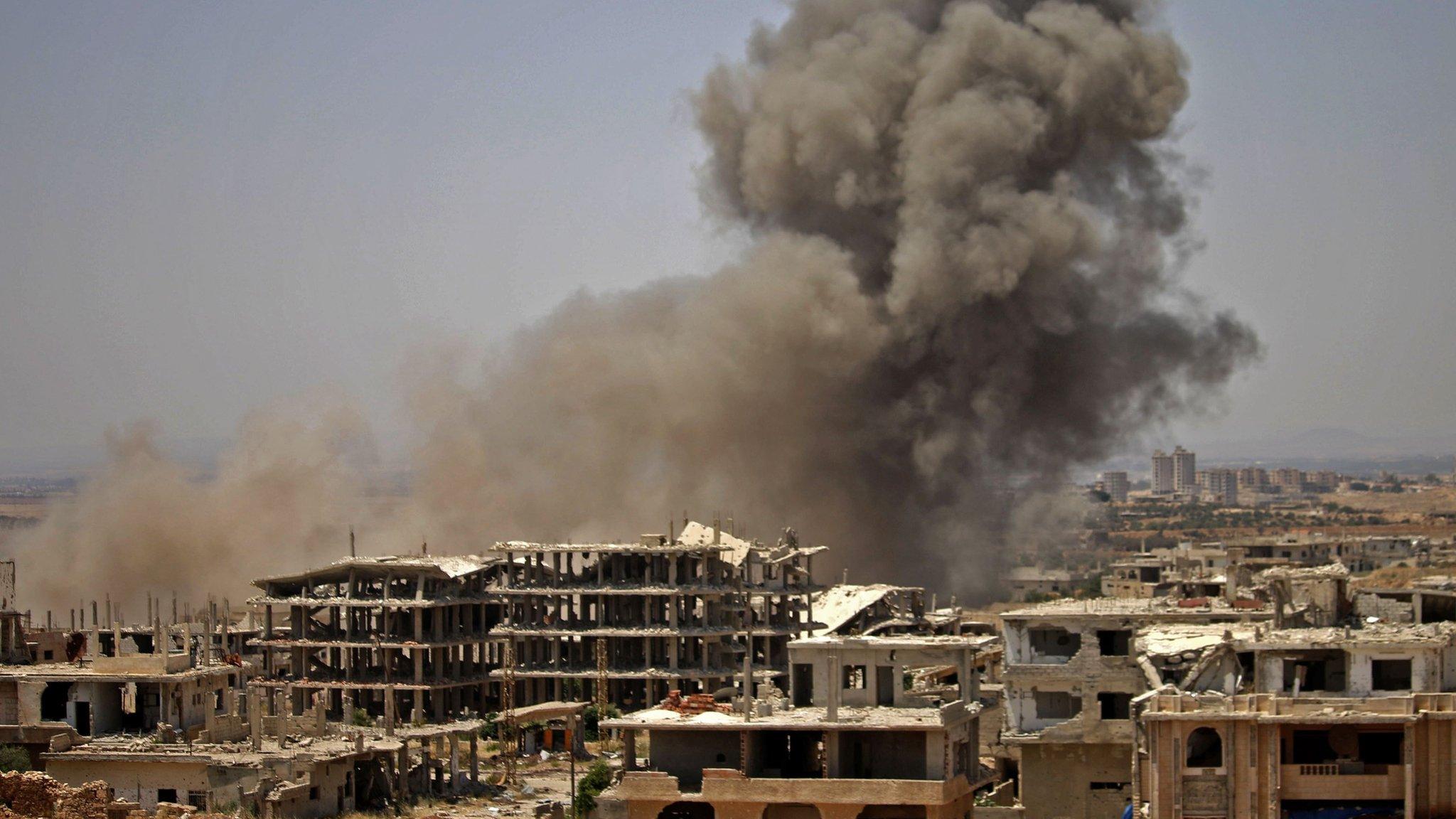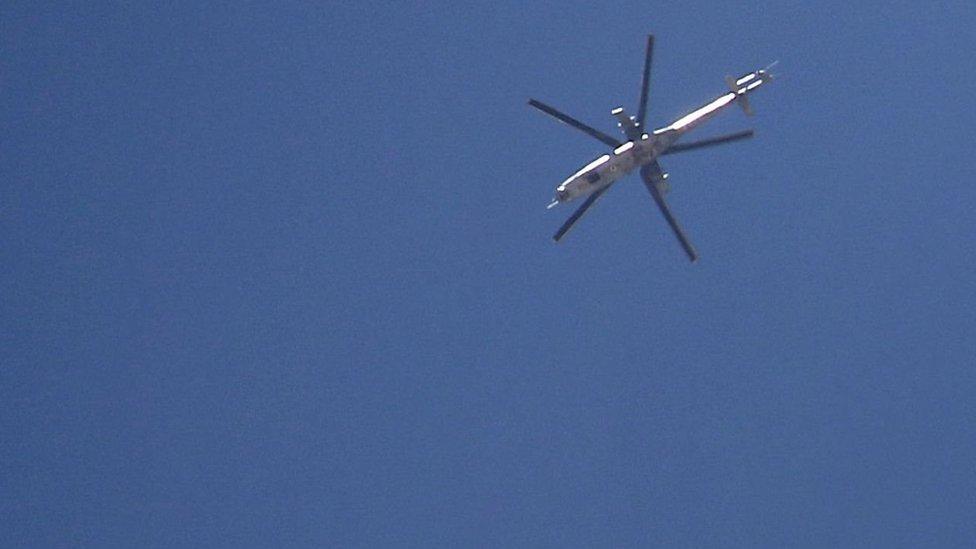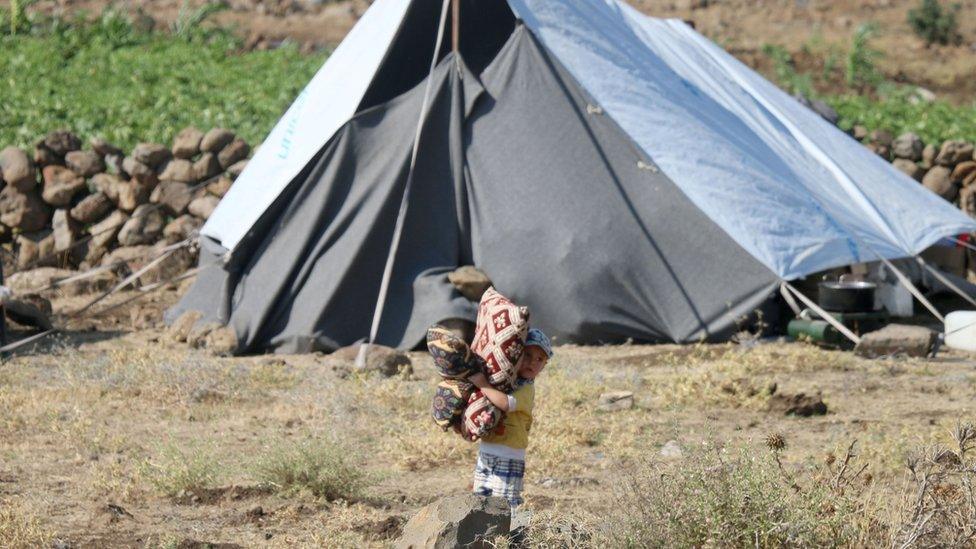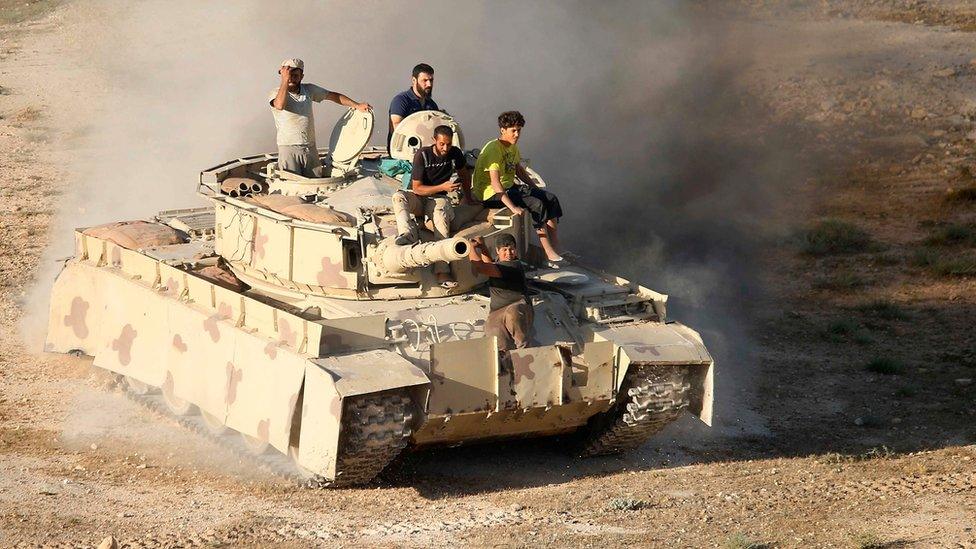Syria war: Air strike on Deraa shelter kills 17 civilians
- Published

Syria's opposition has denounced the US for failing to intervene in the fighting
At least 17 civilians have been killed in an air strike on a basement shelter in south-western Syria, activists say, as warplanes pound rebel-held areas.
A monitoring group reported that five children were among those who died when aircraft identified as Russian bombed Musayfira, east of the city of Deraa.
Russia is backing an army offensive in the region, which borders Jordan and the Israeli-occupied Golan Heights.
More than 90 civilians are said to have been killed since it began 11 days ago.
The provinces of Deraa and Quneitra had been relatively calm for almost a year because of a "de-escalation" agreement brokered by the US and Jordan, which support the opposition, and Russia, a key ally of the government.
However, Syrian President Bashar al-Assad set his sights on retaking them after defeating rebels in the Eastern Ghouta region outside Damascus in April.

The Syrian Observatory for Human Rights said Musayfira was targeted by at least 35 Russian air strikes on Thursday, and that one hit a basement where civilians were taking shelter.
The UK-based monitoring group said 17 people were killed in the attack. But local activists and the Syrian opposition's chief negotiator, Nasr al-Hariri, put the death toll at more than 20.
Air strikes in the towns of Nawa, Dael and Kharaba left another six people dead, external, according to the Syria Civil Defence, whose rescue workers are widely known as the White Helmets.
A media unit run by Lebanon's Hezbollah movement, whose fighters are supporting the Syrian army, later reported that troops had retaken the town of Hirak. Activists said they had advanced into the centre but that fighting was continuing.

Syria's government says its forces are trying to protect civilians from terrorist attacks
The Syrian Observatory for Human Rights said at least 93 civilians, 58 pro-government fighters and 49 rebels had now been killed since hostilities escalated.
The sudden influx of patients has overwhelmed local hospitals and clinics in rebel-held areas, four of which were put out of service by reported air strikes on Tuesday.
"The situation is catastrophic. There is a large number of wounded victims in hospitals, most of them are injuries in the limbs as a result of shrapnel and cluster bombs, in which civilians are getting targeted directly," said Dr Bahaa Mahameed, a doctor from the Union of Medical Care and Relief Organizations (UOSSM) charity.

At least 45,000 civilians have fled the fighting in south-western Syria
The bombardment intensified on Tuesday after the army and allied militias cut in half a strip of rebel-held territory running through north-eastern Deraa and prepared to launch an assault to regain full control of the divided Deraa city.
At the UN Security Council on Wednesday, Syrian permanent representative Bashar Jaafari insisted the army's operations in the south-west were aimed at protecting civilians from artillery attacks by the al-Nusra Front, a former al-Qaeda affiliate now known as Hayat Tahrir al-Sham.
Russia's envoy, Vassily Nebenzia, backed Mr Jaafari's explanation. But US deputy permanent representative Jonathan Cohen said the main opposition force in the area was the Free Syrian Army, a loose alliance of Western-backed rebel factions.

Rebel forces have vowed to repel the government offensive but lost ground in recent days
"To be clear: the unilateral military operations underway by the Assad regime and Russia in south-west Syria represent a violation of the ceasefire arrangement reaffirmed by President Trump and President Putin," Mr Cohen said.
Syria's opposition has denounced Washington for failing to intervene.
Mr Hariri told reporters in Riyadh on Thursday that only a "malicious deal" could explain why the US had told rebel commanders not to expect it to come to their aid when it had carried out air strikes in north-eastern Syria to protect allied Kurdish-led forces when they were attacked by pro-government fighters.
UN officials said on Tuesday that between 45,000 and 50,000 people had fled their homes in Deraa province and head towards Jordan or the Golan Heights. They warned southern border communities would soon be overwhelmed because Jordan had said it would not allow in any more refugees.